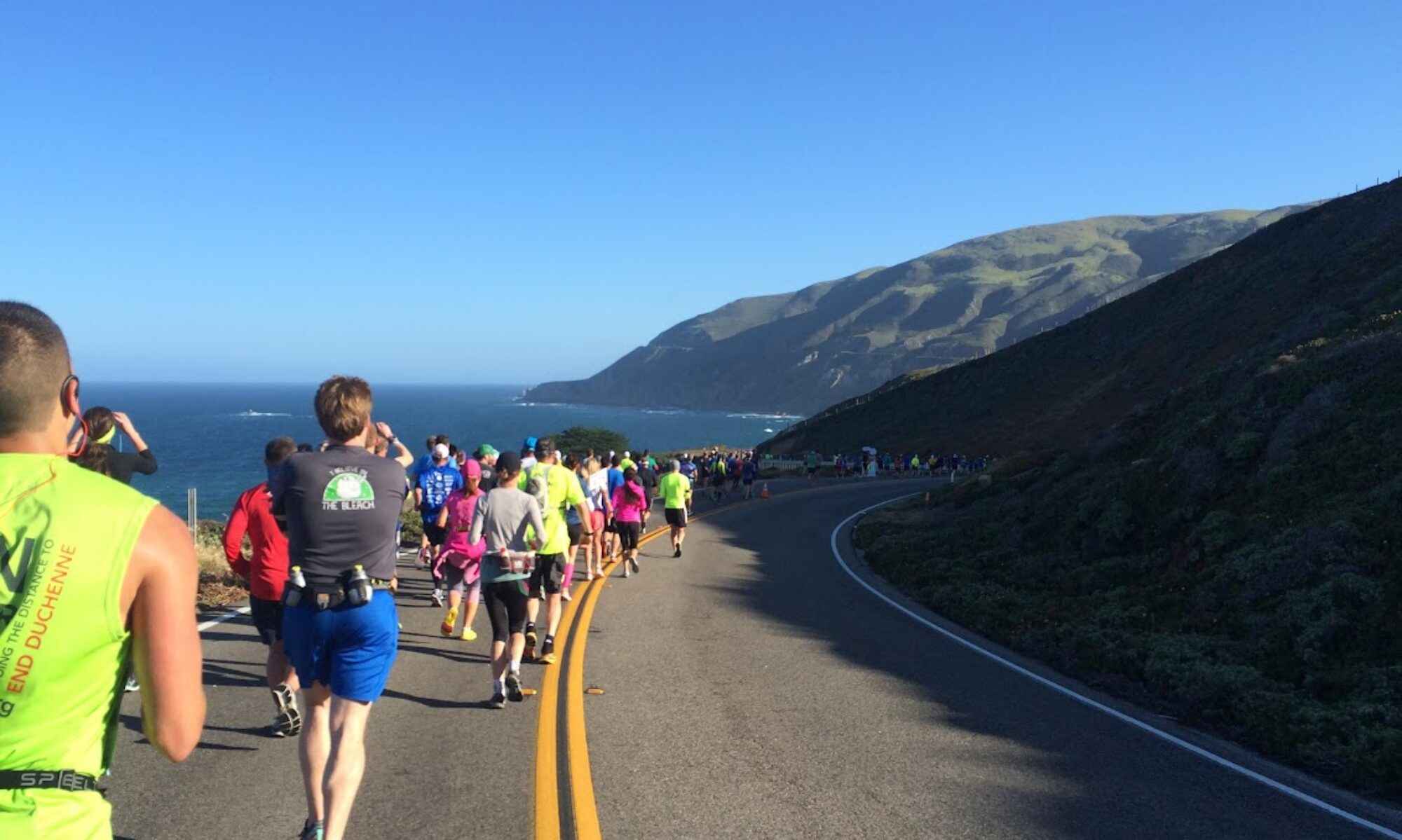
| Sport | Time | Pace |
|---|---|---|
| Swim | 1:40:52 | 2:40/100m |
| T1 | 13:50 | |
| Bike | 7:58:58 | 14 mph |
| T2 | 10:09 | |
| Run | 12.6mi completed | 15:23 min/mi |
Summary
In short, for those of you who don’t want to read my novella, I’m disappointed that I DNF’d, my mind is going through a hundred what-ifs, but I’m thankful for the opportunity for doing this, I enjoyed the race itself, and I wish I had trained more and felt better.
Pre-Race
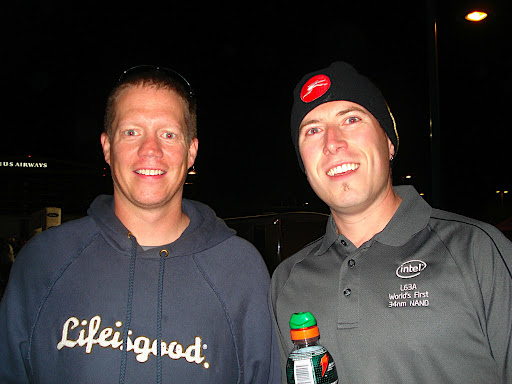
A race so large, long, and complex forces a very different level of organization. Having worked for, and been part of, racing coordination with TBF for a couple of years, I can understand the level of requirements that this takes. Unlike any race I’ve done, the preparation for this race took days. Friday, checkin, badge pickup, and a mandatory race meeting took place. The information was valuable, but not really required. The following day was the real paradigm change: dropping off my bike and gear a day before the race. So much of what I usually do is determined race-morning, that it felt very odd to be handing over so much of my race paraphernalia so early. That said, it made race morning a pretty relaxed, and simple experience.
The next days were filled with family, friends, and enjoying the local Arizona area. Having been there several times for school, Tempe wasn’t a big shock, and so most of the time was just spent in race-day anticipation, eating, and socializing. Two days of pre-attendance just led to way too much free time to kill, and seemed very excessive. It also meant there was plenty of time for problems, like Carrie getting hit by a car in downtown Tempe and being unable to race. Ouch!
Race Start
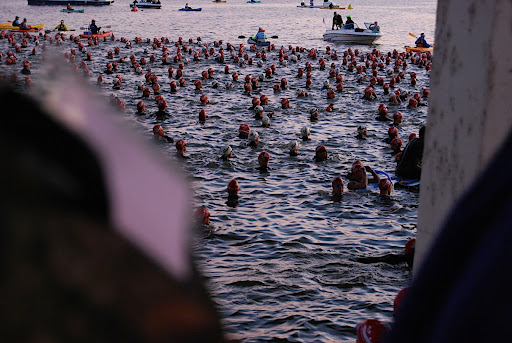
So race day arrives. Twenty minutes traveling down the freeway in the wee hours of morning got me into transition with more than plenty of time to prepare. Staying warm, chatting with Josh,
checking my bike, pre-fueling, getting nervous about the swim, trying to prepare for the freezing cold water. I felt confident in what I had to do: I wasn’t here to race, I was here to finish, and so I wasn’t really doing much but getting ready for a very long day.
The swim start was massive. 2500 people at the start line, treading in the gross and cold water, waiting for fifteen minutes until the gun fired. I’ve done two mile swims, and while I knew I was undertrained for swimming, I wasn’t worried about this part of the race. As Dory would say, “Just keep swimming, just keep swimming, just keep swimming swimming swimming.”
What struck me as unique and different to this swim was the mass of bodies. Every triathlete has been kicked, hit, elbowed, and more; usually, this subsides a few minutes in to the race. With this large of a group all starting together, this practically never ended. I decided to stick close to the lake edge, instead of in the main channel, and to try and avoid much of the cluster. As I started to get bored with the long swim, I spent my time watching the spectators, and counting the cement balls along the side of the lake, passing my time. The water was gross, really gross, and I wish athletes didn’t have to spend so much time in it. I can’t even imagine trying to do such a long swim in salt water, it was bad enough in “fresh” water.
All in all, my swim time was about ten minutes slower than I had expected, but it was fine. I relaxed through the swim, didn’t work hard, didn’t push myself, and was able to swim on course very well. Getting out of the water, I felt fine, no wobbliness, no weakness, and was happy to get into the next stage of the race. If only the wetsuit assistants hadn’t “helped” and gotten my zipper stuck in my leg, I would have been up and out of transition in no time.
The Century
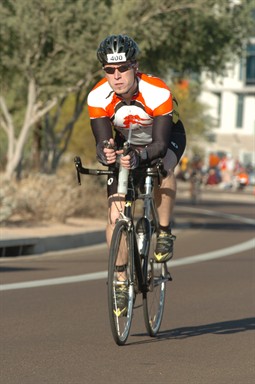
At this point, I need to go back and mention the organization of the race. Coming out of the water, athletes have help pulling off their wetsuits. We run to an area where our pre-packed T1 bags are stationed, off into changing tents where athletes have help with whatever they wish, run out of transition to a line of volunteers applying sunblock, then race out to the bike racks where a volunteer is already holding your bike out, waiting for you to get on. It’s amazing the amount of extra support offered in a race that takes an entire day. I can’t fathom the level of coordination and the numbers of volunteers required to pull this off, but I can understand to some degree why this is by far the most expensive race I’ve ever competed.
The bike was my most worried segment. Thanks to Foxy, I knew that I could complete by going slowly, and so I was less worried about my capability, and more just about the sheer time and energy it would take to finish. Arizona’s course is pretty easy: three there-and-back loops, with a slight uphill all the way out, and a slight downhill all the way back. I found myself going much slower than I expected for the first sixth, but realized on my way back that I had been in slight a headwind, and zoomed back at 20+mph with that wind pushing me along. At this point, I felt fine, though doing the uphill two more times felt a bit daunting.
That’s when everything started going downhill for me. Fortunately, the headwind had turned to a tailwind, and I was feeling better about my speed on the next uphill, but my stomach was not settled one bit. I made my first pitstop at the bottom of the hill, and continued to hydrate and eat as I knew fueling to be critical during the entire bike portion. By the second pitstop, my stomach was still not doing well. I felt like I needed to throw up, and had to stop again to use the facilities. From that point on, I hit every single outhouse on the route, wasn’t keeping down food, and wasn’t keeping down liquids. My pace slowed down, my race went from fine to miserable, but I kept going. I knew that part of finishing an Ironman was just the will to go.
So I finished the bike, enjoying watching for my family along the side, enjoying timing my differential with Josh (which shocked me, he was much faster than me on the first lap, and then seemed to be gaining nothing on my on the next two). I waved to KC, I chatted with a few people in passing, I got frustrated at the number of groupings of bikes (how do they feel okay with cheating like that!), and just kept going, knowing that the run (my best sport), was coming up.
I came in slowly off the bike, nearing the edge of what was allowed, but knowing that I had seven hours to finish a run that would take me much less than that. I still felt awful, but I thought I could finish this, if only I could get in food.
The Yog (soft “J”)
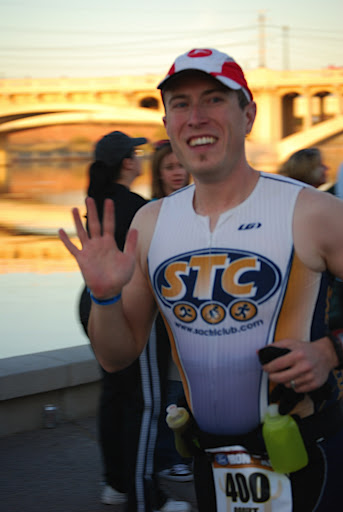
I felt strong for the first couple miles on the run. My bike was slow enough that there was no handicap to my readiness to sludge through these next hours on the pavement, my legs were fine, worked out for sure, but fine. My pace was sub-10s, slow for me, but considering I’d just biked 112 miles, fine. I knew that every moment I jogged, I was catching up with Josh, and I was jogging much more than I was walking.
And then came the resurgence of the fueling issues. The chicken broth was a life-saver, I don’t think I could have made it as far as I did without it, but I think I relied on it too heavily. I hadn’t kept down food, liquid wasn’t keeping down either, and by the end of the first 8-mile lap, I wasn’t feeling good. Looking forward to seeing my family made those first eight miles great, but coming around on the next loops, my body wasn’t allowing me to continue. I started getting light-headed, I had to sit down to keep from passing out, I still was hitting every porto-John, and was still struggling to feel like my body could make it through the next hours.
By mile twelve, being right at transition again, I gave up. The mental battle was weakened by proximity to my exit, my body was telling me I wasn’t safe to go on, and my reserves of strength finally gave out. I couldn’t bring myself to run by transition and make it past transition, into the next half of the second lap. I was finished.
The Frustration
My family was amazingly supportive, and proud of what I had accomplished, but I wasn’t. A plethora of what-ifs still haunt me. If I had trained more, could I have done it? If I hadn’t used gatorade and uncrustables (both newish to me), would I have retained better food? If I hadn’t gotten very sick the Thursday prior, would I have been able to fuel? If I had kept going, would I have gotten past the mental block of being by transition? If the course wasn’t laps, would I have had the desire to run the thirteen miles back versus catching a sag vehicle?
I don’t know that I’ll be back on an Ironman course any time soon to prove to myself that I can do this or not, but I do know that I can’t do this without training much better next time. Maybe after Tripp is 3, not a newborn, I’ll plan on going out again and racing an IM. Until then, I’ll stick to the shorter distances that I find more fun, and the runs which I enjoy more, and leave the big races to the real Ironmen.
